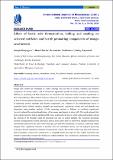| dc.contributor.author | Runyogote, Joseph | |
| dc.contributor.author | Chacha, Musa | |
| dc.contributor.author | Ndabikunze, Bernadette | |
| dc.contributor.author | Raymond, Jofrey | |
| dc.date.accessioned | 2021-02-18T09:52:17Z | |
| dc.date.available | 2021-02-18T09:52:17Z | |
| dc.date.issued | 2020-12 | |
| dc.identifier.uri | http://dx.doi.org/10.12692/ijb/17.6.26-39 | |
| dc.identifier.uri | https://dspace.nm-aist.ac.tz/handle/20.500.12479/1123 | |
| dc.description | This research article published by the International Journal of Biosciences, Vol. 17, No. 6, 2020 | en_US |
| dc.description.abstract | Mango seed kernels are considered as wastes although they are rich in essential nutrients and bioactive compounds for human health. Lack of commercial application (unlike oil seeds) presence of antinutrients, difficulty in processing and little information on nutritional and functional values contribute significantly to their underutilization. These factors underscore the need for processing these seeds to enhance their utilization as food or functional food. The purpose of this study was to investigate which processing technique was capable of improving selected nutrients and bioactive compounds, and reduction of the antinutritional factors to acceptable levels. Selected vitamins, minerals and antinutrients, antioxidant activity and total phenols were determined using standard methods. All the processing methods at different set conditions significantly (p<0.05) reduced the antinutritional factors of the mango seed kernels to above 38%. The results showed that, lactic acid fermentation had no significant differences in all analyzed minerals while boiling and soaking reduced the contents of the minerals except for potassium and zinc on soaked samples. The maximum percentage increase of total phenolic content, antioxidant activity and ascorbic acid was observed in samples fermented with Lactobacillus plantarum and their values were 25%, 37% and 28% respectively. On contrast, boiled and soaked samples had a significant decrease in ascorbic acid and antioxidant activity and all employed processing techniques showed insignifant variations of α-tocopherol content. The results in this study indicated that lactic acid fermentation reduced the antinutrients to acceptable levels and improved the studied nutritional and bioactive compounds as compared to boiling and soaking methods, thus considered as a technique for processing mango seed kernels for functional foods. | en_US |
| dc.language.iso | en | en_US |
| dc.publisher | International Journal of Biosciences | en_US |
| dc.subject | Antioxidant activity | en_US |
| dc.subject | Total phenol | en_US |
| dc.subject | Antinutritional factors | en_US |
| dc.title | Effect of lactic acid fermentation, boiling and soaking on selected nutrients and health promoting components of mango seed kernels | en_US |
| dc.type | Article | en_US |

